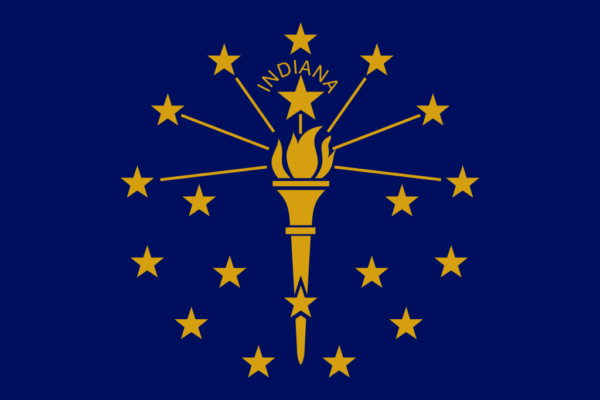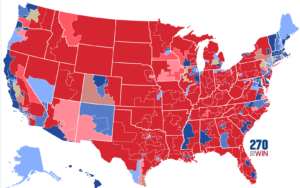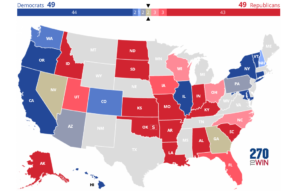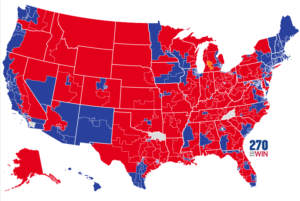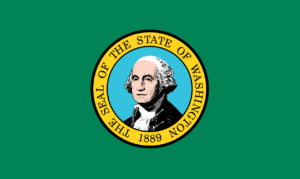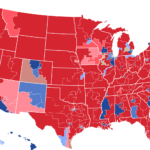As we prepare for the 2020 elections, Yesh Ginsburg and Steen Kirby will give a general overview of all 435 United States House of Representatives races. This is a basic overview to introduce you to the major candidates. All Partisan Lean numbers are taken from the Cook Partisan Voting Index. We will update this page as the races progress if anything noteworthy arises.
Indiana has nine Congressional Districts, one of which is expected to be competitive in November. Two of the districts are controlled by Democrats and seven by Republicans, but one red district is potentially up for grabs.
Indiana’s 1st Congressional District
Incumbent: Peter Visclosky (Democratic, 18th term)
Partisan Lean: D+8
2018 Results:
| Candidate | Votes | % |
| Peter Visclosky (D) | 159,611 | 65.09 |
| Mark Levya (R) | 85,594 | 34.91 |
2016 Results:
| Candidate | Votes | % |
| Peter Visclosky (D) | 207,514 | 81.51 |
| Donna Dunn (L) | 47,051 | 18.48 |
Republican Candidate:
Mark Levya (campaign website)
Levya did not campaign particularly hard in 2018, and doesn’t seem to be doing so again. He actually has a somewhat unique proposal for changing the way patent law works, though otherwise his campaign platform is just the 2020 GOP platform–which itself was just a list of bullet points that President Trump wants to accomplish.
Democratic Candidate:
Frank Mrvan (campaign website)
Mrvan is well-funded and looking to continue the Democratic control of this seat. He is moderately liberal, though is not campaigning on many national party talking points, instead focusing on issues relating to Northwest Indiana.
Indiana’s 2nd Congressional District
Incumbent: Jackie Walorsky (Republican, fourth term)
Partisan Lean: R+11
2018 Results:
| Candidate | Votes | % |
| Jackie Walorsky (R) | 125,499 | 54.83 |
| Mel Hall (D) | 103,363 | 45.16 |
2016 Results:
| Candidate | Votes | % |
| Jackie Walorsky (R) | 164,355 | 59.26 |
| Lynn Coleman (D) | 102,401 | 36.92 |
| Ron Cenkush (L) | 10,601 | 3.82 |
Republican Candidate:
Jackie Walorsky (campaign website)
Walorsky is a somewhat standard Republican, pro-life and against Obamacare. She also focuses on the opioid epidemic, and is somewhat unique in her campaign to fight child hunger in the United States.
Democratic Candidate:
Pat Hackett (campaign website)
Hackett is spending in this race like she has a chance to flip it. Looking at the margin in 2018, it shouldn’t be out of the realm of possibility. She is a progressive Democrat running on universal healthcare, and insinuates that President Trump (or his top staffers) is a white supremacist. How well she does could tell us a lot about the success of progressive campaigns in areas of rural American.
Indiana’s 3rd Congressional District
Incumbent: Jim Banks (Republican, second term)
Partisan Lean: R+18
2018 Results:
| Candidate | Votes | % |
| Jim Banks (R) | 158,927 | 74.93 |
| Courtney Tritch (D) | 86,610 | 25.07 |
2016 Results:
| Candidate | Votes | % |
| Jim Banks (R) | 201,396 | 70.11 |
| Tommy Schrader (D) | 66,023 | 22.98 |
| Pepper Snyder (L) | 19,828 | 6.9 |
Republican Candidate:
Jim Banks (campaign website)
Banks is a popular conservative in this deep red district, running on his record in Congress and highlighting his committee assignments.
Democratic Candidate:
Chip Coldiron (campaign website)
Coldiron, someone disappointingly, doesn’t have a cool campaign slogan based on his name. He is a liberal Democrat running on a $15 federal minimum wage. It will be very interesting to see if that resonates in this district, though he is not campaigning too heavily.
Indiana’s 4th Congressional District
Incumbent: Jim Baird (Republican, first term)
Partisan Lean: R+17
2018 Results:
| Candidate | Votes | % |
| Jim Baird (R) | 156,539 | 64.06 |
| Tobi Beck (D) | 87,824 | 35.94 |
2016 Results:
| Candidate | Votes | % |
| Todd Rokita (R) | 193,412 | 64.59 |
| John Dale (D) | 91,256 | 30.48 |
| Steven Mayoras (L) | 14,766 | 4.93 |
Republican Candidate:
Jim Baird (campaign website)
Baird is a conservative Republican who treats campaigning as a job interview. His platform reads like a CV, though he does support generally very conservative positions across the board.
Democratic Candidate:
Joe Mackey (campaign website)
Mackey is a somewhat liberal Democrat, campaigning on cutting the cap on paying into Social Security and repealing the Republican tax cuts. He does support a far more liberal single-payer healthcare system.
Indiana’s 5th Congressional District
Incumbent: Susan Brooks (Republican, fourth term)
Partisan Lean: R+9
2018 Results:
| Candidate | Votes | % |
| Susan Brooks (R) | 180,035 | 56.76 |
| Dee Thornton (D) | 137,142 | 43.24 |
2016 Results:
| Candidate | Votes | % |
| Susan Brooks (R) | 221,957 | 61.46 |
| Angela Demaree (D) | 123,849 | 34.29 |
| Matthew Wittlief (L) | 15,329 | 4.24 |
Republican Candidate:
Victoria Spartz (campaign website)
Spartz is a conservative Republican, running on cutting the debt, free market healthcare solutions, and building the wall. She is pro-term limits for Congress and is promising not to serve for more than three terms.
Yesh’s notes: Welcome to Indiana’s one battleground district. Spartz had to spend a lot in the primary, currently has far less cash on hand, and is trailing in early polling in this race that is expected to be very tight in this district that is rapidly turning blue.
Democratic Candidate:
Christina Hale (campaign website)
Hale is not yet espousing precise policy programs, though she is offering a general liberal outlook on responses to climate change, healthcare, education, and raising the minimum wage.
Indiana’s 6th Congressional District
Incumbent: Greg Pence (Republican, first term)
Partisan Lean: R+18
2018 Results:
| Candidate | Votes | % |
| Greg Pence (R) | 154,260 | 63.82 |
| Jeannine Lee Lake (D) | 79,430 | 32.86 |
| Tom Fernikhoff (L) | 8,030 | 3.32 |
2016 Results:
| Candidate | Votes | % |
| Luke Messer | 204,920 | 69.14 |
| Barry Welsh (D) | 79,135 | 26.7 |
| Rich Turvey (L) | 12,330 | 4.16 |
Republican Candidate:
Greg Pence (campaign website)
Yes, this is the Vice President’s brother. He won this seat in 2018 without much trouble, and he is facing the same two opponents.
Democratic Candidate:
Jeannine Lee Lake (campaign website)
Lake is a very liberal Democrat. Interestingly enough, her proposed minimum wage hike is only to $10 an hour. She takes stronger liberal positions on issues like guns and LGBT issues, and she is proposing tuition-free college and repudiating student debt.
Indiana’s 7th Congressional District
Incumbent: Andre Carson (Democratic, sixth term)
Partisan Lean: D+11
2018 Results:
| Candidate | Votes | % |
| Andre Carson (D) | 141,139 | 64.86 |
| Wayne Harmon (R) | 76,457 | 35.14 |
2016 Results:
| Candidate | Votes | % |
| Andre Carson (D) | 158,739 | 59.98 |
| Catherine Ping (R) | 94,456 | 35.69 |
| Drew Thompson (L) | 11,475 | 4.34 |
Republican Candidate:
Susan Marie Smith (campaign website)
Smith is a moderate Republican, pushing to lower the national debt and immigration reform. She speaks of how her time teaching English to refugees taught her of Americans’ responsibilities to help people whenever possible–certainly a bold way to present oneself in the current Republican Party.
Democratic Candidate:
Andre Carson (campaign website)
Carson is a liberal Democrat, touting his stint as Senior Whip for the party from 2017-19. He is well liked in this very blue district, and runs on his record of voting for liberal issues.
Indiana’s 8th Congressional District
Incumbent: Larry Bucshon (Republican, fifth term)
Partisan Lean: R+15
2018 Results:
| Candidate | Votes | % |
| Larry Bucshon (R) | 157,396 | 64.43 |
| William Tanoos (D) | 86,895 | 35.57 |
2016 Results:
| Candidate | Votes | % |
| Larry Bucshon (R) | 187,702 | 63.69 |
| Ronald Drake (D) | 93,356 | 31.68 |
| Andrew Horning (L) | 13,655 | 4.63 |
Republican Candidate:
Larry Bucshon (campaign website)
Bucshon is a former heart surgeon who focuses on his solutions to lower health care costs across the country. He is also pro-life and touts his “A” rating from the NRA.
Democratic Candidate:
Thomasina Marsili (campaign website)
Marsili is running a very liberal campaign, focusing on universal healthcare coverage, raising the minimum wage, and general education funding reform. She came through a very tight three-way primary, which is a bit surprising for a district that is unlikely to be at all competitive.
Indiana’s 9th Congressional District
Incumbent: Trey Hollingsworth (Republican, second term)
Partisan Lean: R+13
2018 Results:
| Candidate | Votes | % |
| Trey Hollingsworth (R) | 153,271 | 56.48 |
| Liz Watson (D) | 118,090 | 43.52 |
2016 Results:
| Candidate | Votes | % |
| Trey Hollingsworth (R) | 174,791 | 54.14 |
| Shelli Yoder (D) | 130,627 | 40.46 |
| Russell Brooksbank (L) | 17,425 | 5.4 |
Republican Candidate:
Trey Hollingsworth (campaign website)
Hollinsgworth is a relatively conservatism Republican on most issues, but he takes a hard stance on term limits. He has promised to only serve a maximum of four terms in the House, and he has proposed Constitutional Amendments to establish term limits for the House.
Democratic Candidate:
Andy Ruff (campaign website)
Ruff is a progressive Democrat who is pushing for Medicare for All, the Green New Deal, and a living wage as minimum wage. He won a very contested primary by a solid margin, though he is not currently spending or campaigning too heavily in this solid red district.
Overview
Republicans control seven of these nine districts. The Democrats should definitely hold on to their two in November, and they might be able to flip the 5th District, which is shaping up to be a major battleground.
Interested in the rest of our primers for other House races? We have them all listed on our primer home page.

